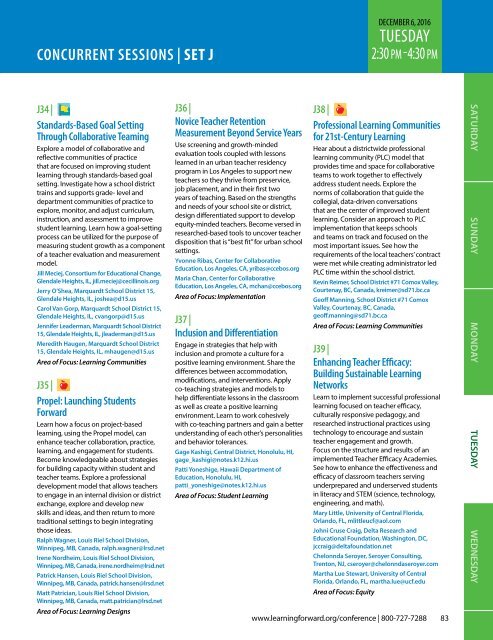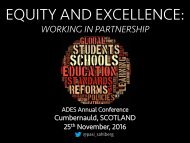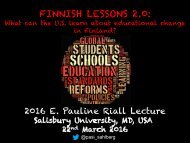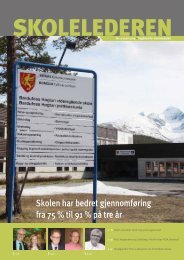learning-forward-2016-annual-conference-program
learning-forward-2016-annual-conference-program
learning-forward-2016-annual-conference-program
You also want an ePaper? Increase the reach of your titles
YUMPU automatically turns print PDFs into web optimized ePapers that Google loves.
CONCURRENT SESSIONS | SET J<br />
DECEMBER 6, <strong>2016</strong><br />
TUESDAY<br />
2:30 PM - 4:30 PM<br />
J34 |<br />
Standards-Based Goal Setting<br />
Through Collaborative Teaming<br />
Explore a model of collaborative and<br />
reflective communities of practice<br />
that are focused on improving student<br />
<strong>learning</strong> through standards-based goal<br />
setting. Investigate how a school district<br />
trains and supports grade- level and<br />
department communities of practice to<br />
explore, monitor, and adjust curriculum,<br />
instruction, and assessment to improve<br />
student <strong>learning</strong>. Learn how a goal-setting<br />
process can be utilized for the purpose of<br />
measuring student growth as a component<br />
of a teacher evaluation and measurement<br />
model.<br />
Jill Meciej, Consortium for Educational Change,<br />
Glendale Heights, IL, jill.meciej@cecillinois.org<br />
Jerry O’Shea, Marquardt School District 15,<br />
Glendale Heights, IL, joshea@d15.us<br />
Carol Van Gorp, Marquardt School District 15,<br />
Glendale Heights, IL, cvangorp@d15.us<br />
Jennifer Leaderman, Marquardt School District<br />
15, Glendale Heights, IL, jleaderman@d15.us<br />
Meredith Haugen, Marquardt School District<br />
15, Glendale Heights, IL, mhaugen@d15.us<br />
Area of Focus: Learning Communities<br />
J35 |<br />
Propel: Launching Students<br />
Forward<br />
Learn how a focus on project-based<br />
<strong>learning</strong>, using the Propel model, can<br />
enhance teacher collaboration, practice,<br />
<strong>learning</strong>, and engagement for students.<br />
Become knowledgeable about strategies<br />
for building capacity within student and<br />
teacher teams. Explore a professional<br />
development model that allows teachers<br />
to engage in an internal division or district<br />
exchange, explore and develop new<br />
skills and ideas, and then return to more<br />
traditional settings to begin integrating<br />
those ideas.<br />
Ralph Wagner, Louis Riel School Division,<br />
Winnipeg, MB, Canada, ralph.wagner@lrsd.net<br />
Irene Nordheim, Louis Riel School Division,<br />
Winnipeg, MB, Canada, irene.nordheim@lrsd.net<br />
Patrick Hansen, Louis Riel School Division,<br />
Winnipeg, MB, Canada, patrick.hansen@lrsd.net<br />
Matt Patrician, Louis Riel School Division,<br />
Winnipeg, MB, Canada, matt.patrician@lrsd.net<br />
Area of Focus: Learning Designs<br />
J36 |<br />
Novice Teacher Retention<br />
Measurement Beyond Service Years<br />
Use screening and growth-minded<br />
evaluation tools coupled with lessons<br />
learned in an urban teacher residency<br />
<strong>program</strong> in Los Angeles to support new<br />
teachers so they thrive from preservice,<br />
job placement, and in their first two<br />
years of teaching. Based on the strengths<br />
and needs of your school site or district,<br />
design differentiated support to develop<br />
equity-minded teachers. Become versed in<br />
researched-based tools to uncover teacher<br />
disposition that is “best fit” for urban school<br />
settings.<br />
Yvonne Ribas, Center for Collaborative<br />
Education, Los Angeles, CA, yribas@ccebos.org<br />
Maria Chan, Center for Collaborative<br />
Education, Los Angeles, CA, mchan@ccebos.org<br />
Area of Focus: Implementation<br />
J37 |<br />
Inclusion and Differentiation<br />
Engage in strategies that help with<br />
inclusion and promote a culture for a<br />
positive <strong>learning</strong> environment. Share the<br />
differences between accommodation,<br />
modifications, and interventions. Apply<br />
co-teaching strategies and models to<br />
help differentiate lessons in the classroom<br />
as well as create a positive <strong>learning</strong><br />
environment. Learn to work cohesively<br />
with co-teaching partners and gain a better<br />
understanding of each other’s personalities<br />
and behavior tolerances.<br />
Gage Kashigi, Central District, Honolulu, HI,<br />
gage_kashigi@notes.k12.hi.us<br />
Patti Yoneshige, Hawaii Department of<br />
Education, Honolulu, HI,<br />
patti_yoneshige@notes.k12.hi.us<br />
Area of Focus: Student Learning<br />
J38 |<br />
Professional Learning Communities<br />
for 21st-Century Learning<br />
Hear about a districtwide professional<br />
<strong>learning</strong> community (PLC) model that<br />
provides time and space for collaborative<br />
teams to work together to effectively<br />
address student needs. Explore the<br />
norms of collaboration that guide the<br />
collegial, data-driven conversations<br />
that are the center of improved student<br />
<strong>learning</strong>. Consider an approach to PLC<br />
implementation that keeps schools<br />
and teams on track and focused on the<br />
most important issues. See how the<br />
requirements of the local teachers’ contract<br />
were met while creating administrator led<br />
PLC time within the school district.<br />
Kevin Reimer, School District #71 Comox Valley,<br />
Courtenay, BC, Canada, kreimer@sd71.bc.ca<br />
Geoff Manning, School District #71 Comox<br />
Valley, Courtenay, BC, Canada,<br />
geoff.manning@sd71.bc.ca<br />
Area of Focus: Learning Communities<br />
J39 |<br />
Enhancing Teacher Efficacy:<br />
Building Sustainable Learning<br />
Networks<br />
Learn to implement successful professional<br />
<strong>learning</strong> focused on teacher efficacy,<br />
culturally responsive pedagogy, and<br />
researched instructional practices using<br />
technology to encourage and sustain<br />
teacher engagement and growth.<br />
Focus on the structure and results of an<br />
implemented Teacher Efficacy Academies.<br />
See how to enhance the effectiveness and<br />
efficacy of classroom teachers serving<br />
underprepared and underserved students<br />
in literacy and STEM (science, technology,<br />
engineering, and math).<br />
Mary Little, University of Central Florida,<br />
Orlando, FL, mlittleucf@aol.com<br />
Johni Cruse Craig, Delta Research and<br />
Educational Foundation, Washington, DC,<br />
jccraig@deltafoundation.net<br />
Chelonnda Seroyer, Seroyer Consulting,<br />
Trenton, NJ, cseroyer@chelonndaseroyer.com<br />
Martha Lue Stewart, University of Central<br />
Florida, Orlando, FL, martha.lue@ucf.edu<br />
Area of Focus: Equity<br />
www.<strong>learning</strong><strong>forward</strong>.org/<strong>conference</strong> | 800-727-7288<br />
83<br />
SATURDAY<br />
SUNDAY MONDAY TUESDAY WEDNESDAY







